Overview
The article examines ten instances where AI technologies are being seamlessly integrated into real estate platforms, particularly to enhance title research and related processes. By automating essential tasks such as data extraction, document processing, and tenant communication, these AI solutions markedly elevate efficiency, accuracy, and decision-making within the industry. This is substantiated by various case studies and statistical insights presented throughout the article, underscoring the transformative impact of AI on real estate operations.
Introduction
The intersection of artificial intelligence and real estate is fundamentally reshaping how industry professionals conduct title research, manage leases, and analyze properties. As AI technologies continue to evolve, they promise to streamline complex processes, enhance decision-making, and improve overall efficiency within the sector. However, with the rapid adoption of these tools, a pressing question arises: how can real estate professionals effectively navigate the challenges and opportunities presented by AI to stay ahead in an increasingly competitive market? This article explores ten compelling examples of AI applications in real estate platforms, highlighting their transformative impact on title research and beyond.
Parse AI: Revolutionizing Title Research with Machine Learning
Parse AI harnesses advanced machine learning algorithms to meticulously analyze and extract vital information from extensive collections of title documents. This automation of the data extraction process drastically reduces the time and effort traditionally required for title research. Consequently, this innovation not only enhances precision but also enables title researchers to focus on more intricate tasks, thereby significantly improving workflow efficiency in property transactions.
For instance:
- 73% of business leaders believe that machine learning will improve their productivity.
- 31% of organizations using machine learning in sales and marketing have observed increased revenue.
Such advancements underscore the critical role of AI in streamlining title research, which includes examples of AI in real estate platforms that allow professionals to navigate the complexities of real estate transactions with greater ease and precision.
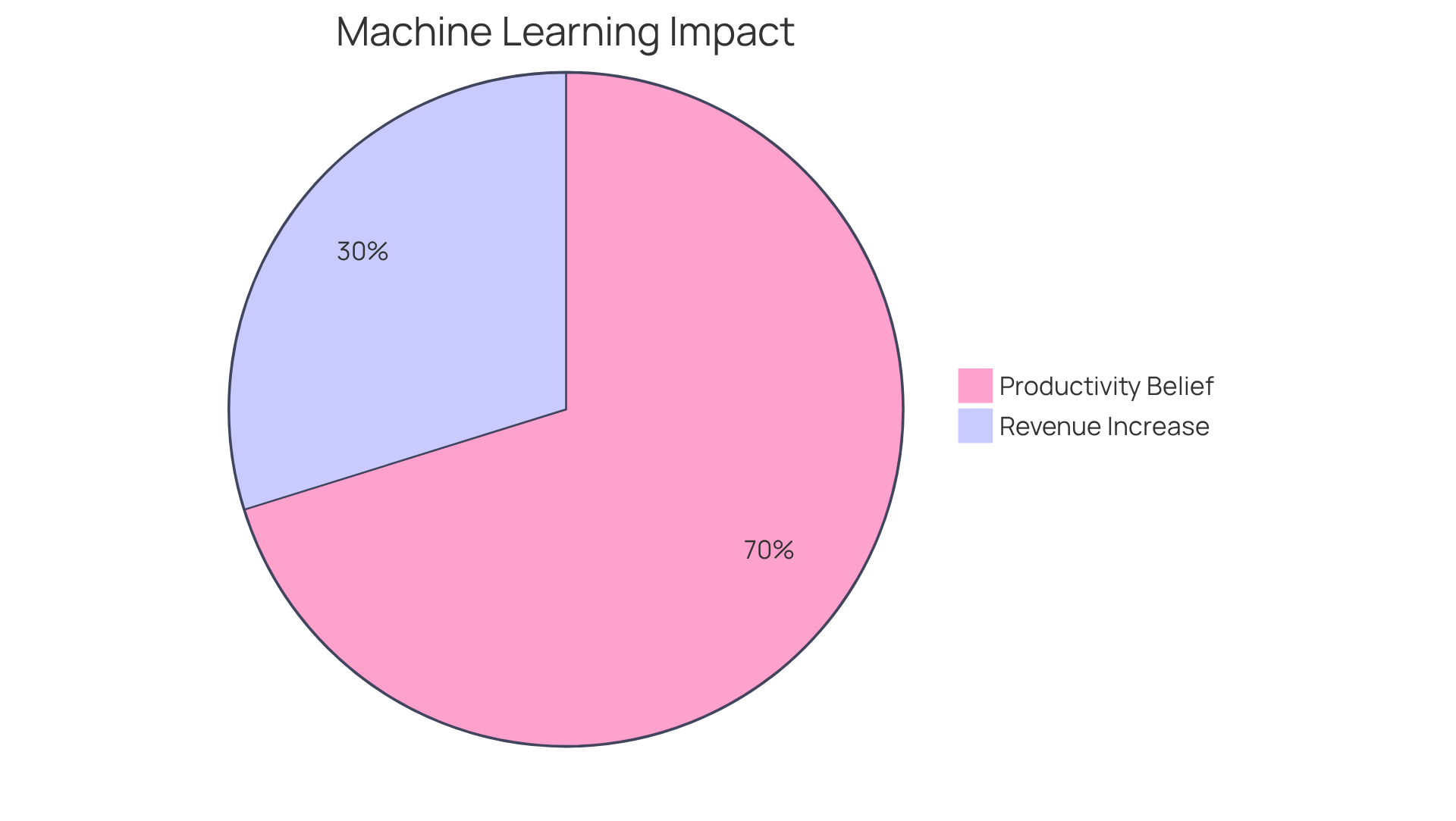
LeaseLens: Streamlining Lease Management Processes
LeaseLens harnesses the power of AI to automate critical lease management tasks, such as tracking key dates, obligations, and compliance requirements. By providing real-time insights and alerts, it empowers real estate managers to avoid costly penalties and enhance operational efficiency. This capability proves especially advantageous for managing extensive portfolios, where manual tracking often leads to errors and inefficiencies.
Notably, 75% of management experts advocate for automation in auditing and compliance tasks. Consequently, tools like LeaseLens not only improve operational efficiency but also significantly reduce the risk of non-compliance.
As real estate managers increasingly recognize the importance of automating lease processes, incorporating AI technologies like LeaseLens and Parse AI's advanced machine learning tools—such as the examples of AI in real estate platforms for swift annotation and extraction of information from unstructured documents—becomes essential for navigating the complexities of lease management.
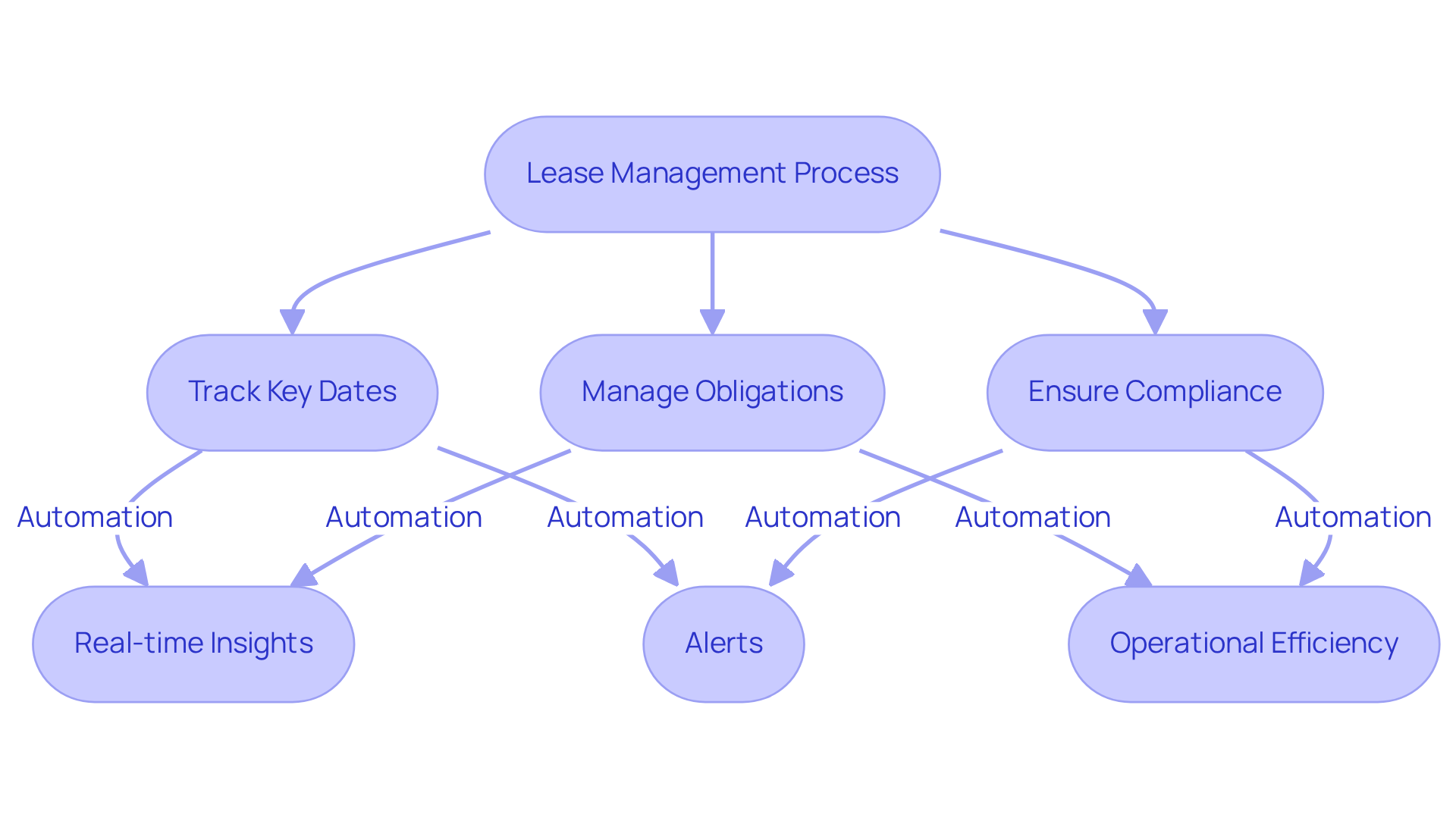
Prophia: Enhancing Property Analysis with AI Insights
Prophia harnesses the power of AI to meticulously analyze asset information, delivering crucial insights that empower industry professionals to efficiently evaluate market trends and asset values. By automating data collection and analysis, Prophia significantly accelerates decision-making, enabling users to swiftly adapt to market dynamics. This capability not only bolsters their competitive edge but also aligns with broader industry trends, where examples of AI in real estate platforms are becoming increasingly indispensable for informed investment strategies.
Notably, examples of AI in real estate platforms can predict housing price trends with an impressive 95% accuracy, and the market is projected to reach USD 41.5 billion by 2033, driven by AI advancements. Furthermore, case studies demonstrate that companies utilizing examples of AI in real estate platforms, specifically AI-driven property management platforms, have achieved remarkable outcomes, including a 40% increase in property occupancy and a 9% rise in rental income.
As the property landscape evolves, Prophia emerges as an essential resource for professionals seeking to navigate market complexities with precision and agility.
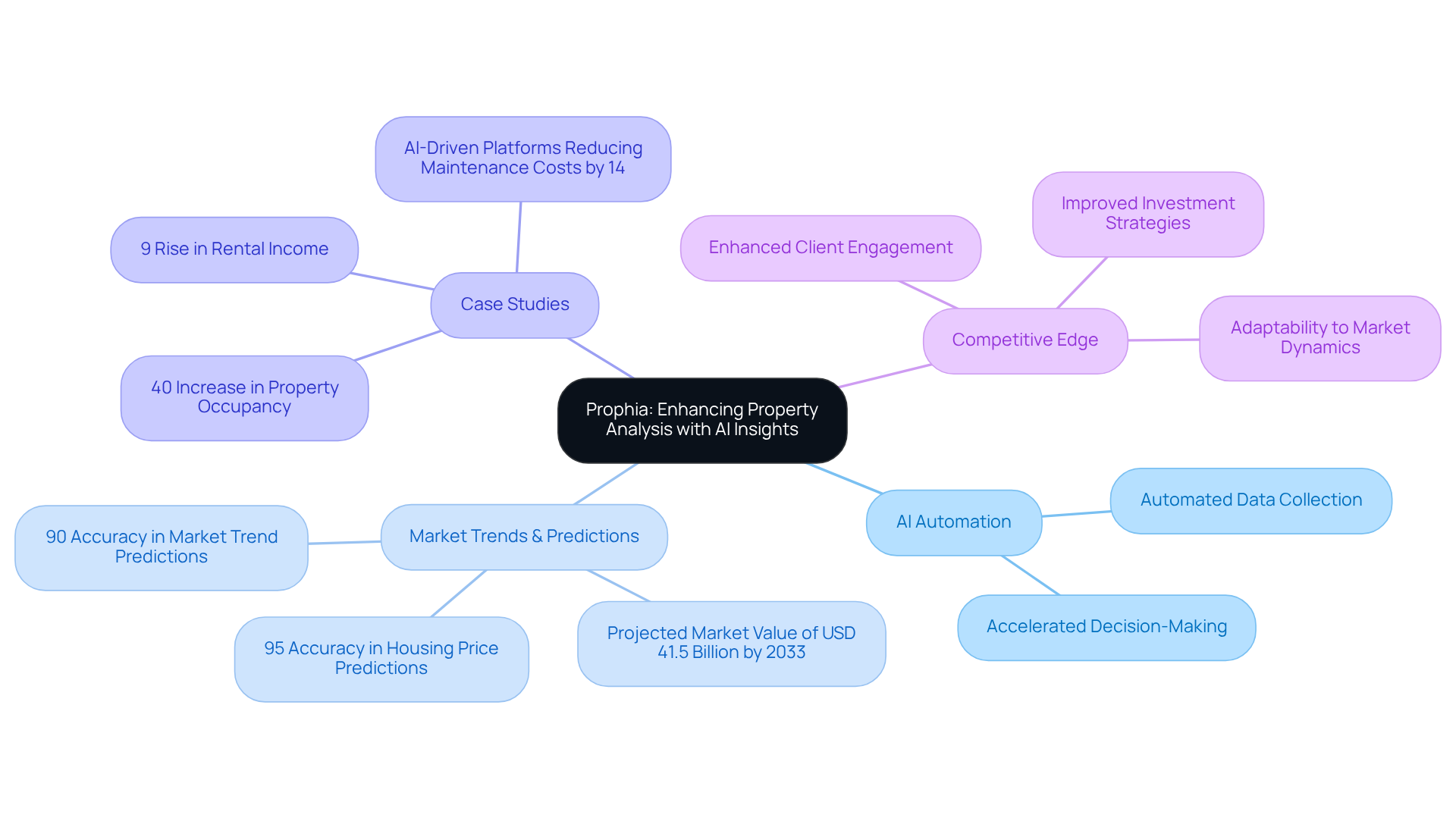
Docsumo: Automating Document Processing for Efficiency
Docsumo revolutionizes the extraction of information from property documents, such as contracts and agreements, by leveraging advanced optical character recognition (OCR) and machine learning technologies. This automation significantly reduces manual information entry errors, achieving accuracy rates of up to 99% for structured documents. Consequently, the document review process is expedited, enabling real estate professionals to focus their efforts on strategic initiatives instead of being encumbered by administrative tasks.
For instance, Westland Real Estate Group reported a remarkable reduction in document processing time by over 50% after implementing Docsumo, underscoring the platform's effectiveness in enhancing operational efficiency. Furthermore, organizations that adopt document automation experience up to a 75% decrease in costs associated with manual labor for document handling, highlighting the financial advantages of such technologies.
Notably, AI retrieves information four times faster than manual methods, further emphasizing the efficacy of AI in document processing. Additionally, employee productivity increases by an average of 40% when automated workflows replace manual data entry, illustrating the transformative impact of automation on workforce efficiency.
Overall, the integration of OCR and machine learning not only streamlines workflows but also fosters a more productive environment for property professionals. As Docsumo's technology continues to advance, it aligns with the broader market trend, where the global AI market in real estate is projected to reach $41.5 billion by 2033, growing at an annual rate of 30.5%.
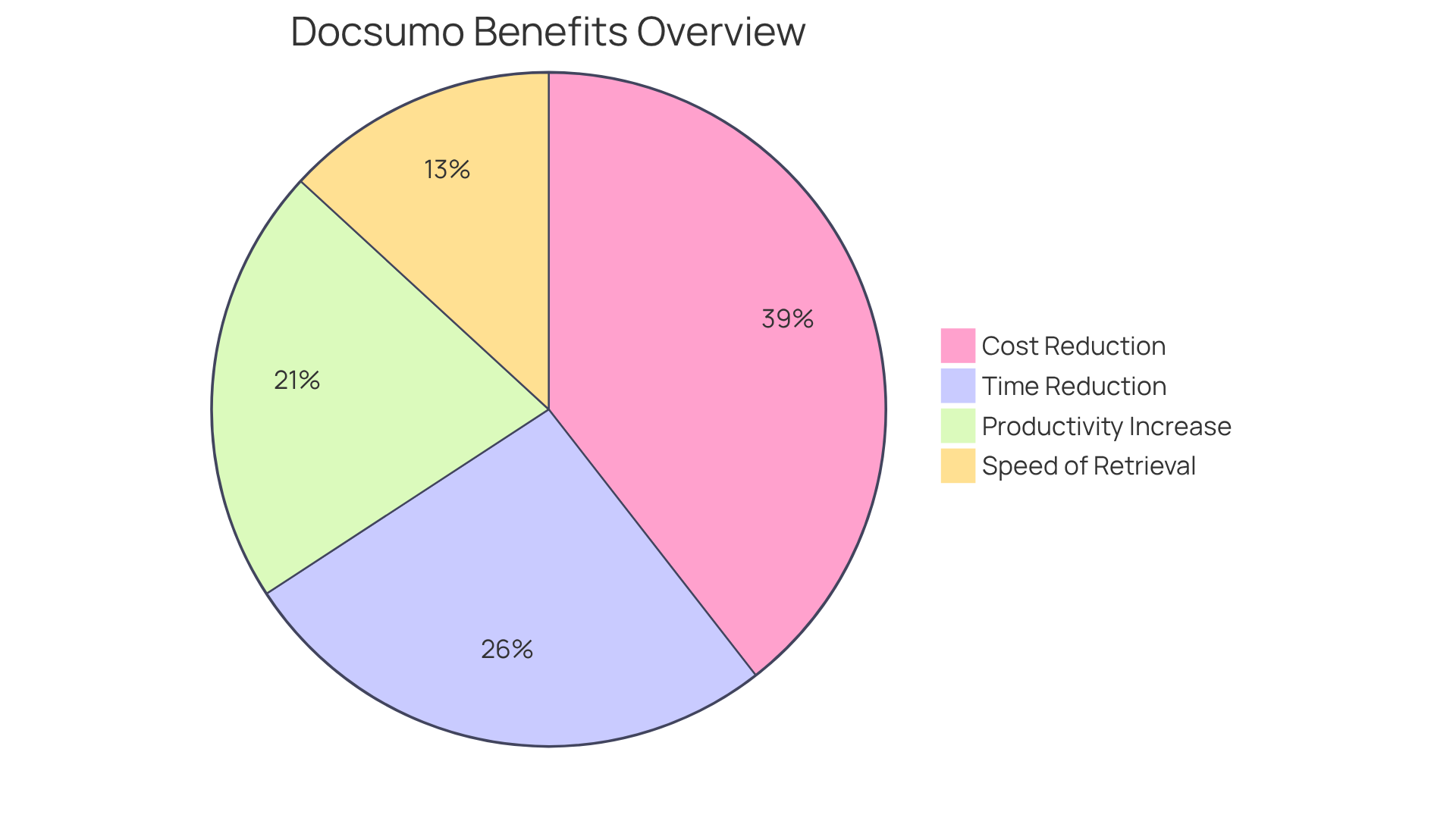
Elise AI: Enhancing Tenant Experience with Personalized Communication
Elise AI harnesses data-driven insights to customize communication with tenants, delivering tailored messages for rent reminders, maintenance updates, and community events. This proactive strategy not only elevates tenant satisfaction but also cultivates a sense of community within buildings, significantly enhancing tenant retention.
According to industry insights, personalized communication can boost tenant satisfaction scores by as much as 20%. Moreover, analyzing tenant behaviors and preferences can further influence retention rates.
Case studies reveal that properties utilizing Elise AI have experienced a notable decline in turnover rates, with managers highlighting the efficacy of personalized interactions. One manager remarked, 'Personalized communication has led to improved lease renewal rates and overall tenant loyalty.'
By prioritizing individualized communication, Elise AI establishes itself as an indispensable tool in the dynamic realm of property management, ensuring tenants remain satisfied and committed to their living environments.
Furthermore, the global Tenant Experience AI market is projected to reach $9.4 billion by 2033, underscoring the increasing importance of AI-driven solutions in enhancing tenant experiences.
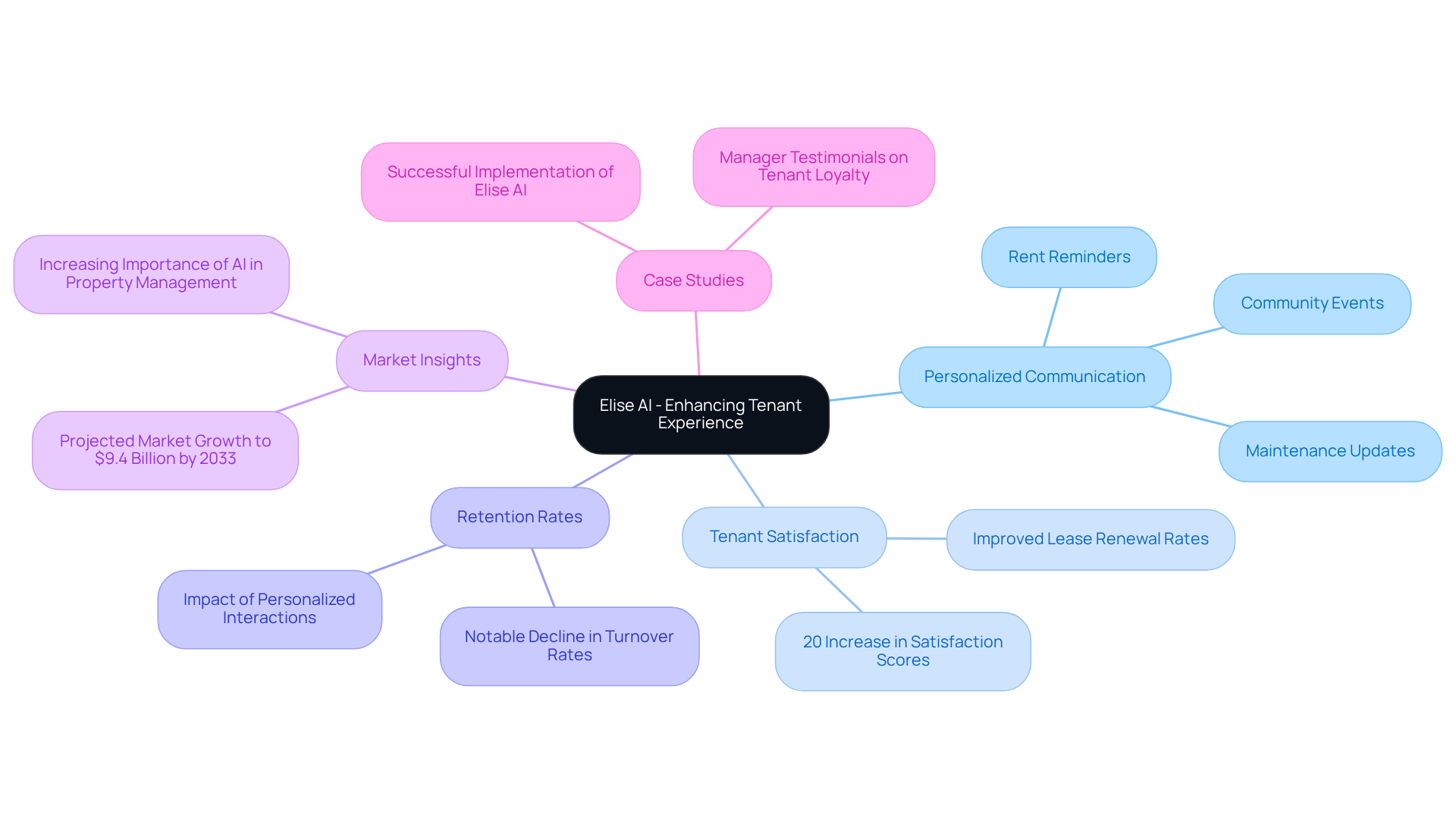
PipeCRE: Optimizing Commercial Real Estate Data Management
PipeCRE is an AI-driven platform that revolutionizes information management for commercial real estate professionals. By automating information entry and classification, it significantly mitigates the risk of errors and enhances accessibility. This optimization empowers users to concentrate on strategic decision-making rather than being inundated with information management tasks.
Companies utilizing such automation have reported operational cost reductions of up to 50% alongside notable productivity increases. As one industry specialist noted, automating information entry not only streamlines workflows but also fosters a more agile decision-making environment, enabling professionals to respond swiftly to market fluctuations.
The impact of AI on information accessibility is profound, allowing property professionals to retrieve essential details rapidly and efficiently, ultimately resulting in improved business outcomes.
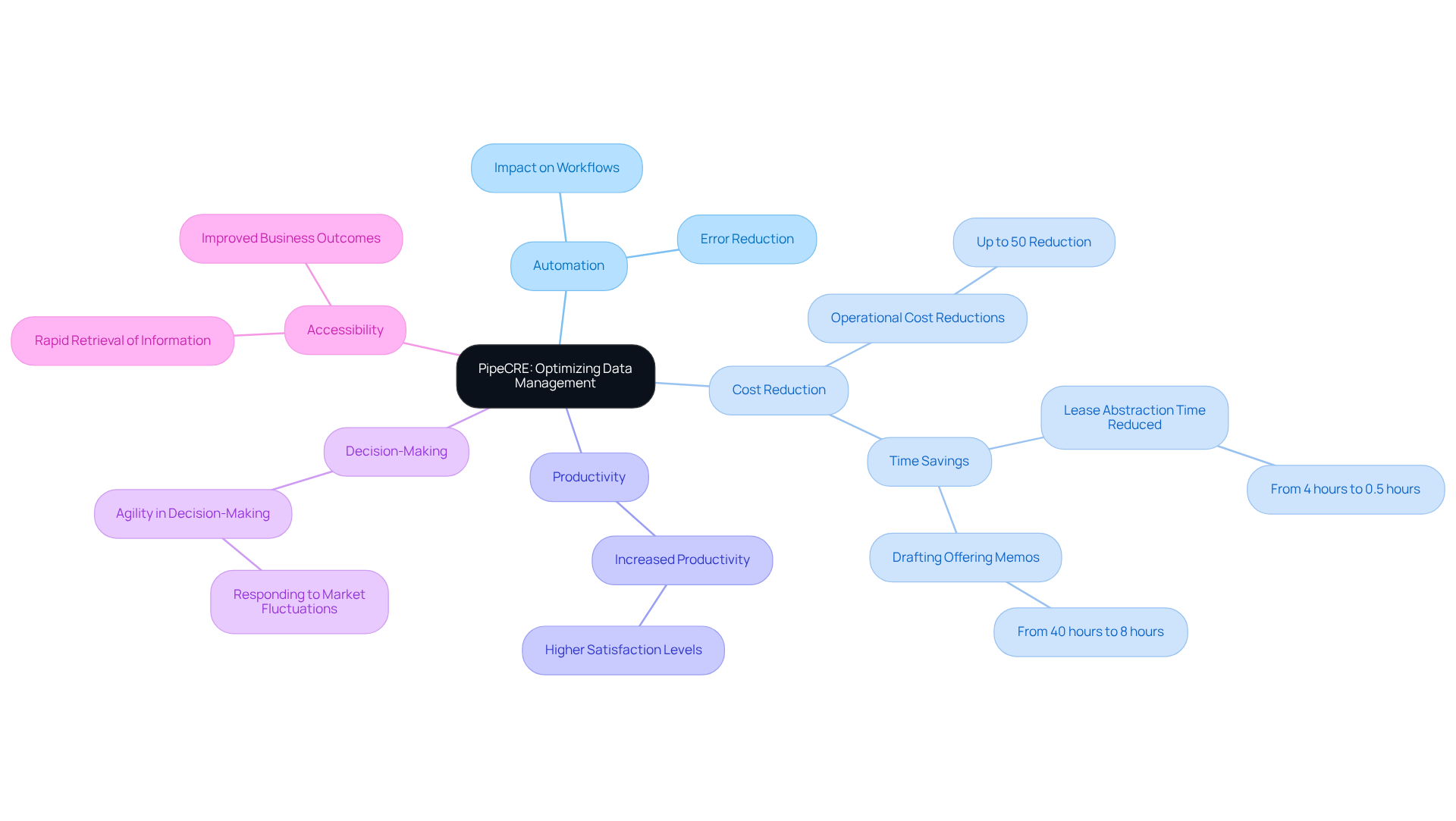
AI Tools for Data Analysis: Staying Ahead in Real Estate Market Trends
AI-driven data analysis tools empower property professionals to effectively track market trends, assess competitor performance, and predict future developments. By harnessing predictive analytics, these tools facilitate data-driven decision-making that is in tune with evolving market dynamics.
For instance, predictive models can identify early warning signs of asset underperformance, such as declining tenant credit scores or oversupply in specific segments. This capability enables firms to take proactive measures aimed at preserving portfolio value.
Furthermore, according to a Deloitte study, over 72% of property firms utilize predictive analytics to identify investment opportunities and manage risks efficiently. This strategic approach not only enhances operational efficiency but also positions firms to adapt swiftly to market fluctuations, ensuring they maintain a competitive edge in a rapidly changing landscape.
With the AI in the property market projected to reach $975.24 billion by 2029, the reliance on these technologies is becoming increasingly essential for effective strategic planning.
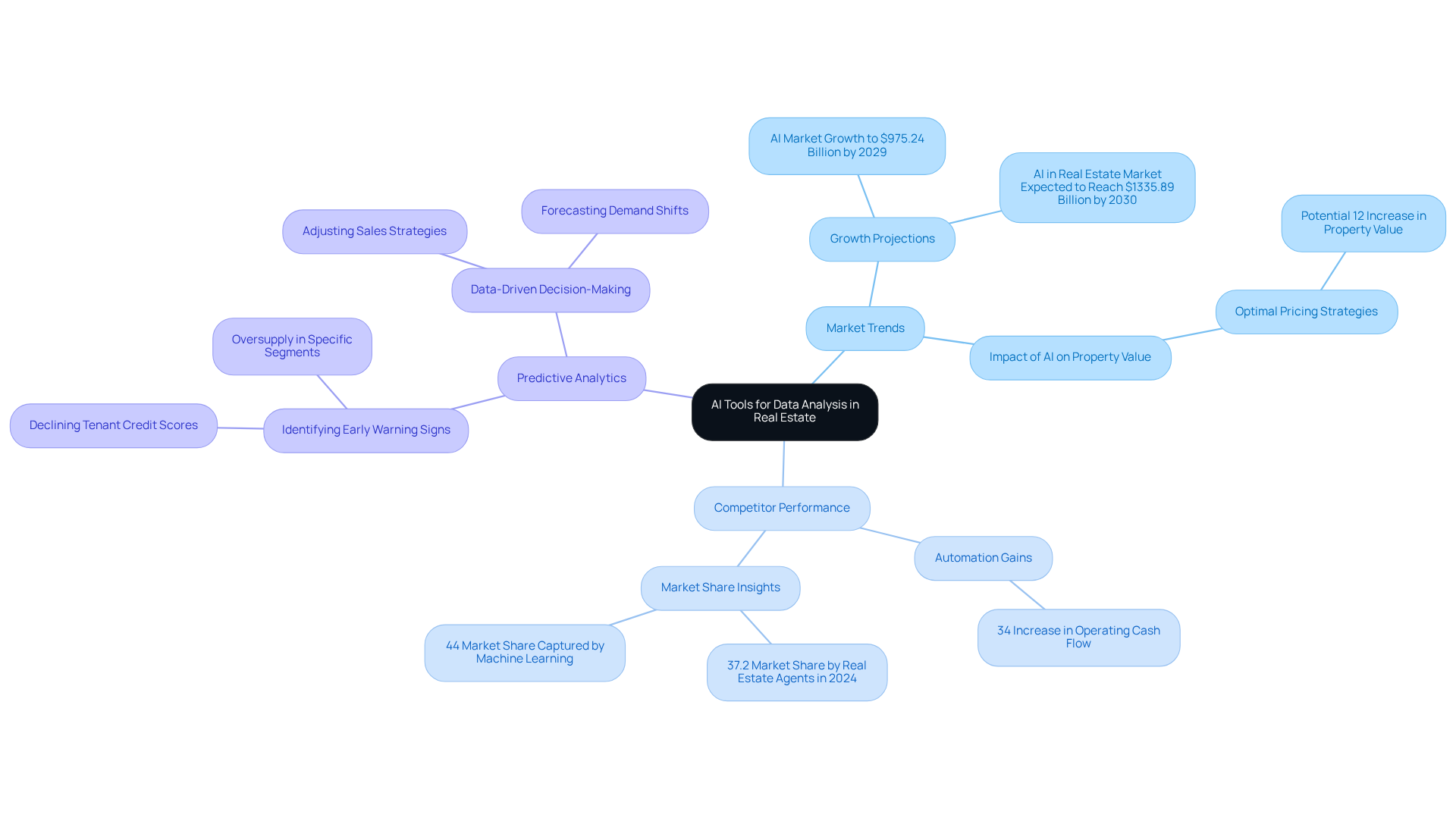
Generative AI Assistants: Transforming Report Creation in Real Estate
Generative AI assistants are revolutionizing the report creation process in property by automatically generating summaries, insights, and visualizations from raw data. This automation not only significantly reduces the time spent on report writing but also enhances the consistency and accuracy of the reports produced. Consequently, property professionals can redirect their focus from tedious manual tasks to more strategic analysis and decision-making.
Success stories abound; many professionals have noted that AI-driven report generation leads to improved operational efficiency and higher-quality outputs. For instance, 86% of companies utilizing generative AI report revenue growth, underscoring the technology's potential to transform workflows and elevate the standard of reporting in the industry.
By leveraging AI assistants, property teams can ensure that their reports are not only timely but also exhibit a high level of accuracy, ultimately facilitating improved business results.
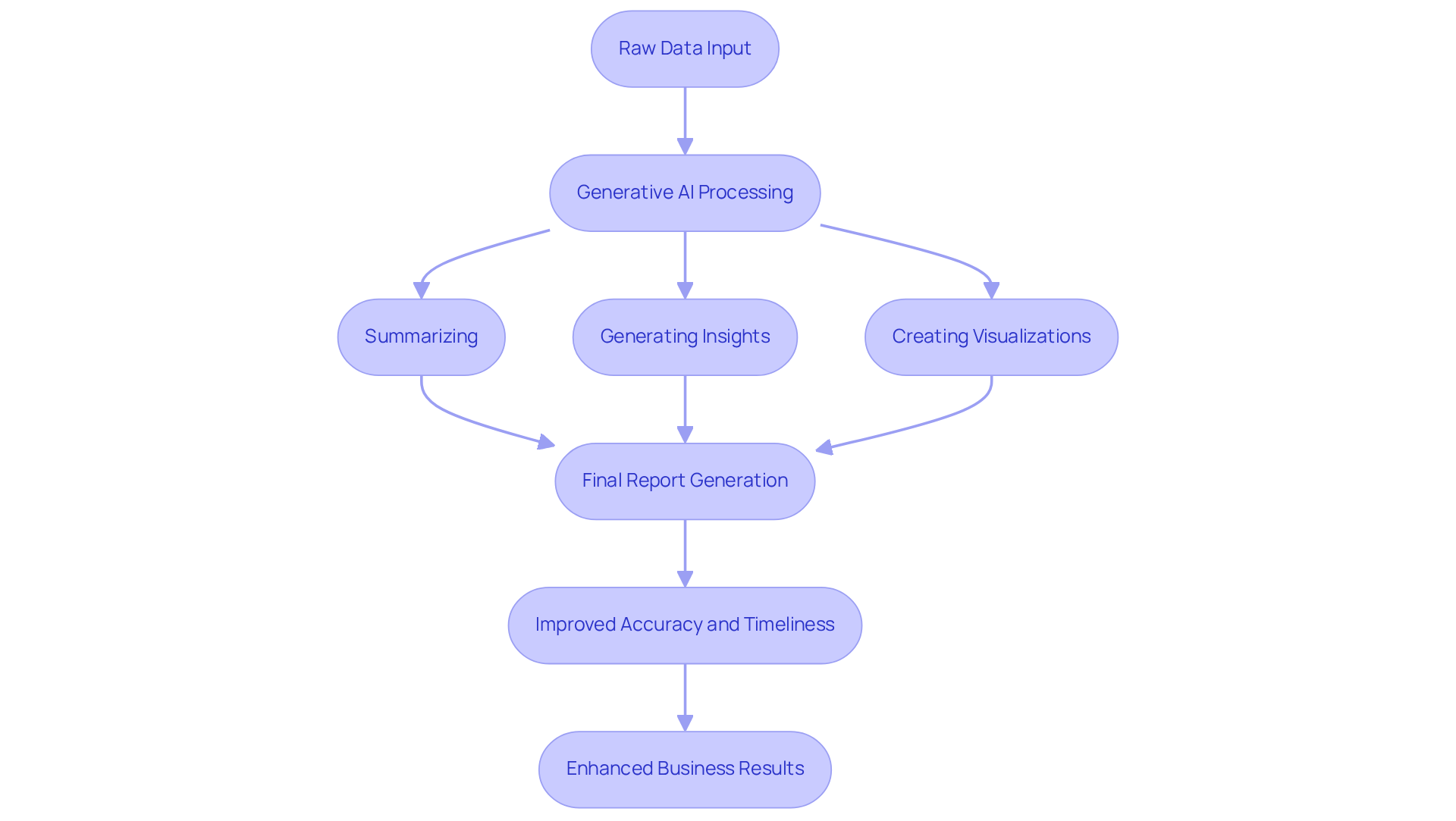
AI-Driven ESG Analytics: Focusing on Sustainability in Real Estate
AI-driven ESG analytics empower professionals to evaluate the sustainability performance of their assets and ensure compliance with regulations. By meticulously examining data related to energy consumption, waste management, and social impact, these advanced tools deliver actionable insights. Consequently, organizations can enhance their marketability while aligning with investor expectations, thus driving sustainable growth.
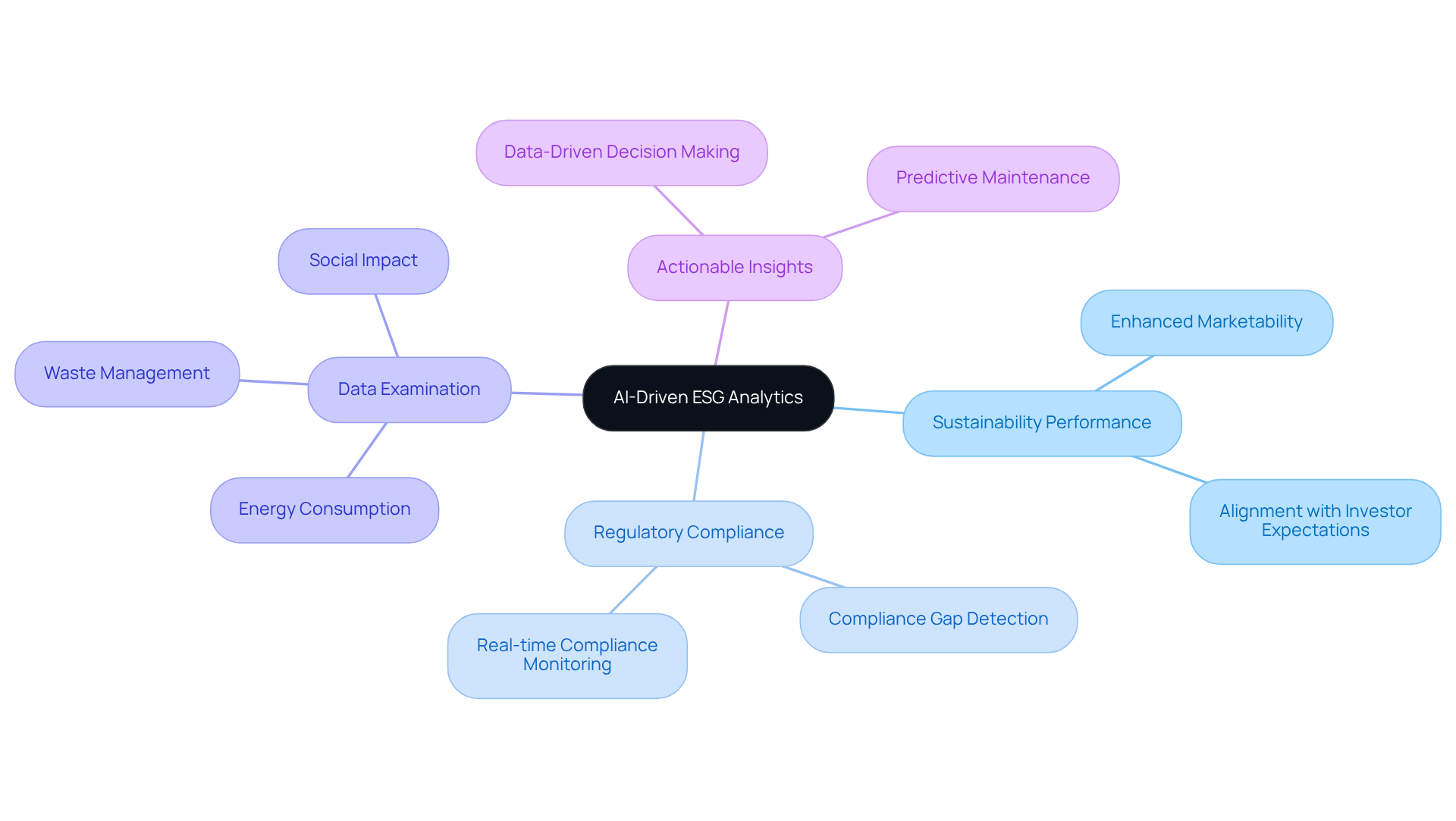
Emerging Trends in AI Tools: The Future of Commercial Real Estate
Emerging trends in AI tools for commercial property are significantly transforming the industry landscape, particularly through advancements in predictive analytics, enhanced information visualization, and improved automation capabilities. Predictive analytics is revolutionizing operations by enabling property professionals to anticipate market trends, evaluate property values, and refine investment strategies. For instance, predictive models can analyze historical data to forecast fluctuations in rental demand and pricing, empowering companies to make informed decisions that enhance profitability. Approximately 75% of US property firms have initiated the use of AI in their operations, underscoring the trend of AI adoption within the sector.
As organizations increasingly embrace these technologies, they are witnessing marked improvements in operational efficiency. AI tools can automate labor-intensive tasks such as document processing and data entry, allowing professionals to concentrate on strategic insights. A notable case study involves JLL's Hank platform, which integrates AI to optimize building management, resulting in a 45% reduction in HVAC energy consumption and enhanced indoor air quality.
Industry leaders stress the significance of these advancements. For example, Michael Villegas from IA Interior Architects asserts that AI complements human expertise, enhancing creativity and problem-solving capabilities in design processes. Furthermore, RTS Labs observes that predictive models can assess energy consumption and sustainability risks in properties, further illustrating the diverse benefits of AI in the property market. Moreover, as the global AI in property market is projected to reach $1.8 trillion by 2030, the demand for advanced AI tools will only escalate, fostering further innovation.
Looking ahead, the future of predictive analytics in property appears promising, with ongoing advancements expected to improve information accuracy and decision-making processes. However, it is essential to remain vigilant regarding the risks associated with AI adoption, such as data privacy breaches and algorithmic bias. As firms continue to harness AI for operational enhancements, the integration of predictive analytics will be pivotal in shaping tenant experiences and optimizing real estate investments.
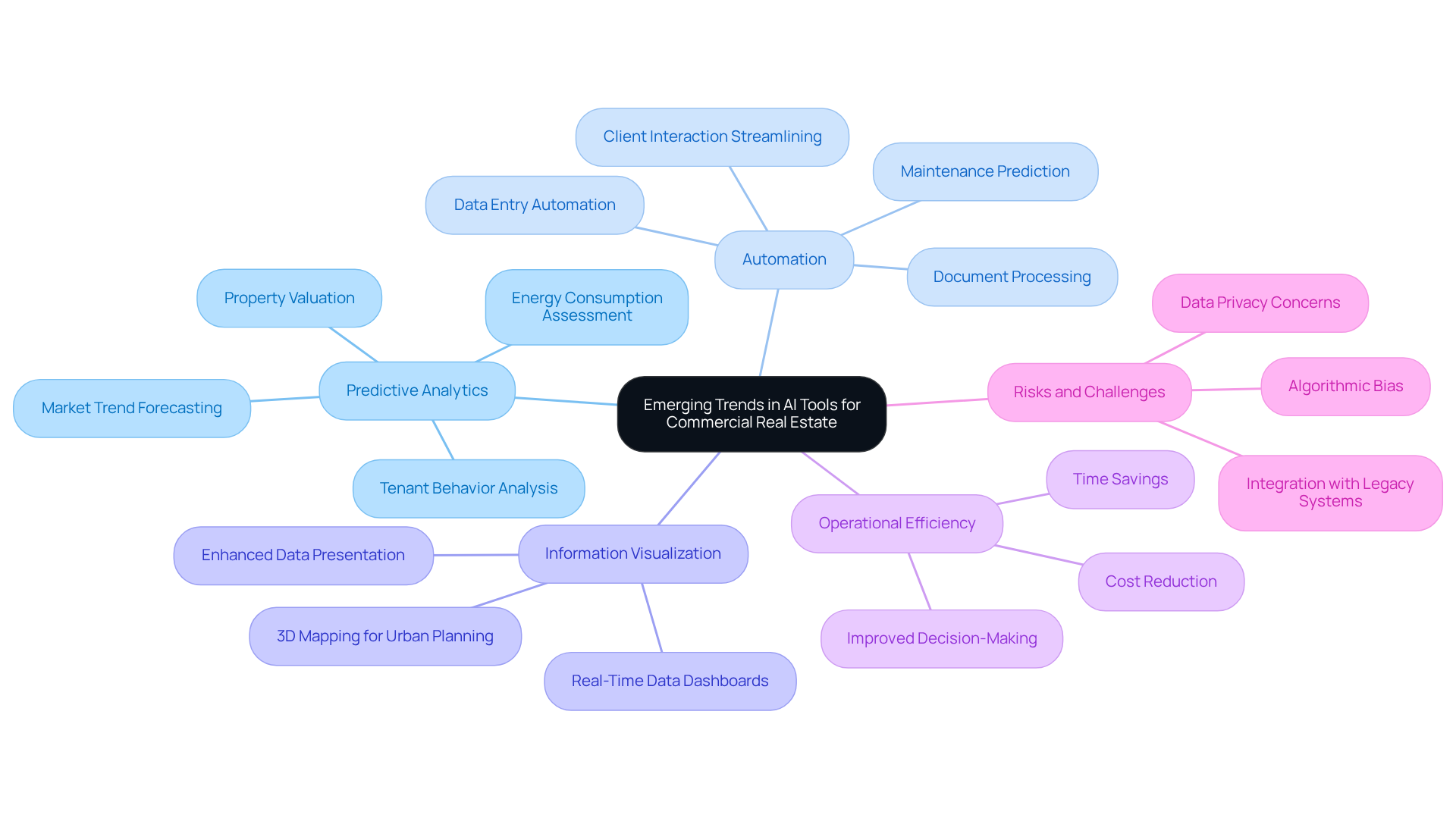
Conclusion
The integration of artificial intelligence within real estate platforms is fundamentally reshaping the landscape of title research and property management. By leveraging advanced technologies such as machine learning, automation, and data analytics, these tools significantly enhance operational efficiency, accuracy, and decision-making across various aspects of the industry. The examples of AI discussed—from Parse AI's sophisticated document analysis to Elise AI's personalized tenant communications—illustrate a marked shift towards smarter, more efficient workflows that empower real estate professionals to concentrate on strategic initiatives rather than cumbersome administrative tasks.
Throughout the article, key insights reveal how AI applications are streamlining processes in title research, lease management, property analysis, document processing, and tenant engagement. Platforms like LeaseLens and Docsumo showcase the tangible benefits of automation, while Prophia and PipeCRE underscore the importance of data-driven insights for informed decision-making. The statistics presented, such as the projected growth of the AI market in real estate, highlight the increasing reliance on these technologies to maintain competitiveness in a rapidly evolving marketplace.
As the real estate sector continues to embrace AI-driven solutions, professionals are encouraged to explore these innovations to enhance their operations and adapt to market dynamics. The future of real estate is undeniably intertwined with advancements in AI, making it essential for industry stakeholders to remain informed and proactive in leveraging these tools for improved outcomes. Embracing this technological evolution not only positions firms for success but also fosters a more sustainable and efficient real estate environment.
Frequently Asked Questions
What is Parse AI and how does it improve title research?
Parse AI utilizes advanced machine learning algorithms to analyze and extract vital information from large collections of title documents, significantly reducing the time and effort needed for title research. This automation enhances precision and allows researchers to focus on more complex tasks, improving workflow efficiency in property transactions.
What statistics support the effectiveness of machine learning in business?
According to recent findings, 73% of business leaders believe that machine learning will enhance their productivity, and 31% of organizations using machine learning in sales and marketing have reported increased revenue.
How does LeaseLens optimize lease management processes?
LeaseLens automates critical lease management tasks such as tracking key dates, obligations, and compliance requirements. It provides real-time insights and alerts, helping real estate managers avoid costly penalties and improve operational efficiency, especially when managing large portfolios.
What percentage of management experts support automation in auditing and compliance tasks?
75% of management experts advocate for automation in auditing and compliance tasks, highlighting its importance in improving operational efficiency and reducing the risk of non-compliance.
What role does Prophia play in property analysis?
Prophia uses AI to analyze asset information, providing crucial insights that help industry professionals evaluate market trends and asset values efficiently. It automates data collection and analysis, accelerating decision-making and enabling users to adapt to market dynamics.
How accurate are AI predictions for housing price trends?
AI in real estate platforms can predict housing price trends with an impressive 95% accuracy, demonstrating the reliability of AI-driven insights in the property market.
What is the projected market value for AI in real estate by 2033?
The market for AI in real estate is projected to reach USD 41.5 billion by 2033, driven by advancements in AI technology.
What outcomes have companies experienced by utilizing AI in property management?
Companies that have implemented AI-driven property management platforms have achieved significant results, including a 40% increase in property occupancy and a 9% rise in rental income.




